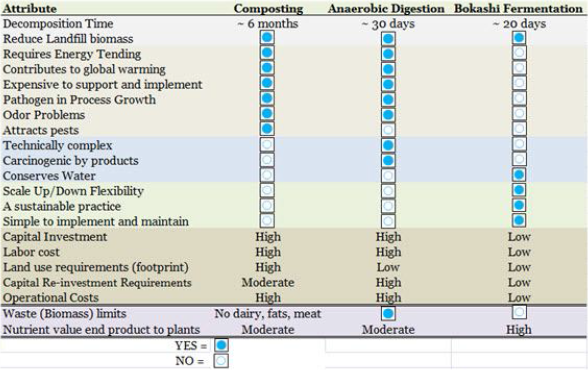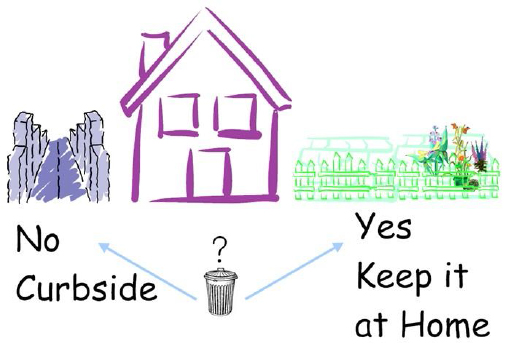What are you doing with your Food Waste?
If you’re still throwing all those food scraps into a garbage can…..it’s time to change. Do you buy plastic garbage bags and carry out a smelly heavy wet bag every week? Is your garbage can filling up too fast? Are you tired of the smelly messy can?
Maybe you’re a composter. Are you adding dairy and meat products to your compost pile? Does it work in the cold and wet weather? What do you do in the winter? Bokashi fermenting works indoors and you’ll make far fewer trips outdoors into the wet
or cold weather.
Nobody enjoys messing with organic waste. Food waste decomposes and putrefies so quickly. It’s messy, smelly, attracts rodents and insects. If you live near the forest or in certain areas where wildlife are abundant, you’ll attract them and find it expensive,
difficult and a hassle keeping the animals away.
It’s not a lot of fun picking up the trash after an animal scatters it about. It’s a lot less fun to encounter animals in your backyard.
Maybe you live in a town or city where they want you to purchase an extra container for your organic waste. We all know how important it is to recycle waste and most of us know you can’t keep putting it into the landfill.
Start using a bokashi fermenter and you’ll see how easy it is to save money. You won’t be buying any more plastic trash bags. You won’t have to buy fertilizers for your garden. You’ll be able to keep your house plants healthy and vibrant all year around and you’ll no longer have to put up with flies and rodent problems.
Curbside Bins and Crocks – Don’t solve the problem
Portland recently started their food scrap recycling program which is similar to plans other cities hope their citizens will happily adopt.
Although this is the current trend and one likely to be forced upon many communities because most city managers are unaware that there are superior more efficient ways to handle the organic waste, I doubt the communities will happily adopt this way of handling organic waste.
Adding extra bins to the curbside collection is an unnecessary additional cost citizens will have to accept. It costs a lot to compost organic waste. Cities have to ship the material great distances to have it processed. Collecting the waste is also costly. Sadly, with this
policy the rich nutrients in the organic waste are allowed to oxidize with a greater than 50% reduction in mass. Carbon ends up in the atmosphere instead of in the ground where
it would do some good.
An Advanced Alternative Environmentally Friendly Method for Organic Waste Processing
A more efficient environmentally friendly solution is needed. We all agree that we can’t continue putting it into a landfill. Land is too precious and we want to avoid polluting our ground water and atmosphere.
One solution is to compost the organic waste. Another solution is to digest the waste in a methane producing plant (AD technologies). Composting takes a long time, requires a lot of effort and equipment, is not particularly efficient, and ties up land that could be used more efficiently in other ways. Composting sites are smelly and can’t be located where people live and work because they are unwelcome neighbors. Nobody wants a house or business next to a composting site.
AD methane producing plants are very expensive and hard to manage and ultimately toxic in the environment. They are not easy to scale up. Large operations are hard to manage and once in place require a guaranteed supply of waste for many years to cover the cost in building the plant. Maintenance costs are also high.
A third alternative, Bokashi (acidic anaerobic) fermentation is the simplest, least costly, and fastest way of recycling organic waste. It is an anaerobic process with specialized microbes and requires only 10 days to reach its end point and the bio-pulp obtained has a high market value.
Unlike the composting process and AD technologies which contribute significantly to greenhouse gas production, Bokashi fermenting virtually eliminates all greenhouse gases related to organic waste cycling. Virtually all of the carbon returns to the soil where it is sequestered.
Bokashi fermenting can be done all throughout the year, is very scalable, produces neither heat nor gases, and eliminates nuisance factors like odors and vermin linked to composting sites.
Most importantly, this technology can dramatically reduce the community’s dependence on petro derived products. The fermented bio-pulp when mixed with soil establishes healthy high organic content soil free of pathogens and no additional fertilizers are required.
Farm lands can thus be greatly improved and run more efficiently by cycling the bio-pulp through the soil. When waste is processed and recycled to the land, true sustainable agricultural practices are easily achieved. This cycling process conserves water too and the nutrients produced by bokashi fermenting are avidly fixed in the soil reducing ground water nutrient leaching which has been a difficult problem to resolve in the farming communities.
Table 1: Attribute Comparison for Composting Anaerobic Digestion and Bokashi Fermentation

It is important to more carefully examine the attributes related to methods used to recycle organic waste before any one method is adopted. These attributes are summarized in Table 1above. Bokashi fermenting is by far the superior least toxic and most cost effective way to solve the organic waste problem.
Curbside diversion programs using bokashi fermenting in a residential setting are easy to implement. The home owner takes responsibility to process all organic waste in the home so none of the waste every gets to the curbside. Cities no longer have a need to pick up the organic waste saving labor and fuel and time.
http://www.bokashicycle.com/curb.html

Cities adopting a bokashi fermenting plant can process industrial/commercial organic waste easily in a small space and no longer have to ship the waste to a facility where much of the material will be oxidized in a composting operation.
https://www.bokashicycle.com/Indus.html
Organic waste should be processed locally where it is produced. Cycling the end product (bio-pulp) to the surrounding gardens, farms and parks is a positive welcome benefit. The soil organic content, so badly depleted over years of neglect can easily be restored resulting in truly sustainable practices.
Conserving water, cleaning up the soil, and reducing greenhouse gases in a cost efficient process that takes little effort and time makes a lot of sense. Bokashi fermenting is the only one of the 3 options that is easy to implement, costs little to put in place, cleans up the air and water and restores soil needed to grow products we consume free of chemicals and toxins.
Bokashi fermenting is the easy way to process all food scraps right at home. You need a few simple tools to do the job. Once you get started you’ll wonder why everyone doesn’t get involved. It’s just so simple.
